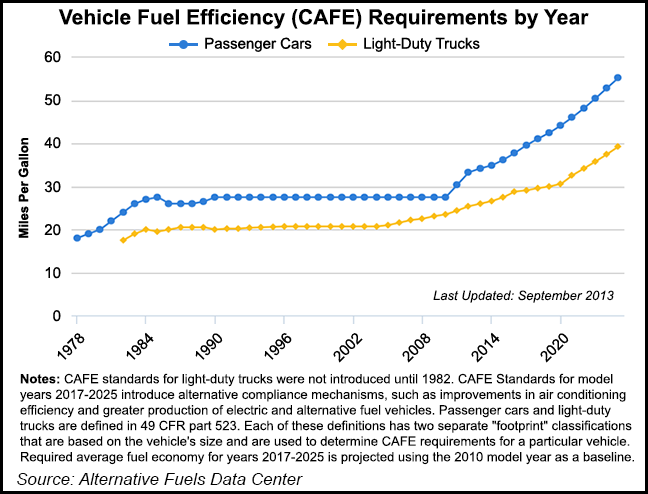NGI All News Access | Infrastructure
NGV Sector Eyeing House Fuel Efficiency Bill
Consumer and natural gas vehicle (NGV) advocacy organizations have a new target to keep an eye on, House Resolution 4011, which could discourage mandated fuel savings in future models.

The measure by Michigan Reps. Fred Upton, a Republican, and Democrat Debbie Dingell, would “weaken the federal standards for fuel efficiency” and lead to consumers spending billions more at the pump, said Consumers Union’s Shannon Baker-Branstetter, senior policy counsel. The proposal, she said, would be a windfall for the auto industry at the expense of consumers.
“The current fuel economy program already provides extensive flexibility for automakers to produce fuel-efficient vehicles.”
However, Upton said the legislation would establish a “strong” national fuel economy standard to “harmonize separate sets of fuel economy regulations at the state and federal levels.”
Upton said the bill would make vehicles more affordable as current conflicting regulatory requirements have driven up costs. A similar bill has been introduced in the Senate.
NGVAmerica President Daniel Gage said the organization will study the legislation to determine its possible impacts. Gage said Consumers Union focuses on expanded fuel efficient options and cost-saving choices, so “perhaps it will advocate for the growing use of abundant, domestic and cost-effective natural gas.”
Dingell highlighted another bill that she reintroduced, the Vehicle Innovations Act, which would promote investments in “clean” technologies for more fuel-efficient vehicles, reductions in U.S. dependence on foreign oil and to support U.S. auto manufacturers and suppliers.
Meanwhile, the U.S. Department of Energy (DOE) has up to $4 million available for research projects on medium- and heavy-duty NGV engine technologies. Producers and suppliers of renewable natural gas (RNG) want to enhance the near-zero-emission aspects of thelow-NOx engines, particularly in the heavy-duty vehicle sector.
The DOE program aims to develop more “diesel-like efficiency” in NGV engines while meeting emissions standards to “improve the viability” of medium- and heavy-duty vehicles. Projects selected are expected to complement early stage research on medium- and heavy-duty engine technologies.
DOE’s Vehicle Technologies Office also is seeking projects to address barriers to adopting NGVs through early stage research.
Meanwhile, the California Air Resources Board (CARB) said Amp America recorded the “cleanest” emission score ever in a certification program for RNG fuel production from the Indiana Fair Oaks Farms. The fueling operation was certified with a CI/carbon intensity score of negative 254.94 gCOe/MJ, the lowest ever issued by CARB.
The Indiana operation, which supplies most of its output to California via pipeline, is the first and so far only Environmental Protection Agency renewable fuel standard-certified dairy waste-to-vehicle fuel project in the nation, according to Amp.
Elsewhere, Germany’s Cryonorm Systems has been selected by Uniper subsidiary Liqvis to design and install two public access modular liquefied natural gas fueling stations. The turn-key installation uses pre-fabricated and transportable design. Each station is designed with dual dispensers to fuel as many as 100 vehicles daily.
© 2024 Natural Gas Intelligence. All rights reserved.
ISSN © 1532-1231 | ISSN © 2577-9877 |
